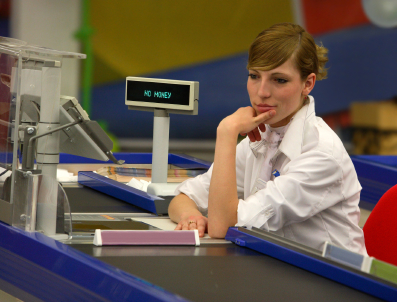| News News Archive  Email A Friend Email A Friend
April 25, 2024
California Department of Industrial Relations and Cal/OSHA Will Honor Workers’ Memorial Day at Four Events in California on April 28th-29th 2024. Cal/OSHA Joining Partners in Arcadia, Richmond, San Diego and San Francisco. April 23, 2024
California Division of Workers' Compensation Launches Online Portal for Submission of QME Medical-Legal Reports April 22, 2024
California Division of Workers’ Compensation Posts Updated Time of Hire Notice April 22, 2024
Sullivan on Comp Launches ChatSOC. It's an Innovative Chatbot for California Workers' Compensation Professionals Integrated with an Authoritative Legal Treatise

|  | Have A Seat. Retail Cashiers May Just Take A Load Off After K-Mart Employees Class Action Suit.
By Jorge Alexandria - December 10, 2012
There may be no greater absurdity in business, and workers compensation by de-facto, than denying a seat to a retail cashier with tired feet after standing for most of his/her eight hours shift. Still this is what is happening statewide as many banks and retail facilities fail to provide suitable seating to their employees in violation of a little known California Labor Code (section 1198) and the provision in California Wage Orders.
Importantly, the seating provisions of the Wage Orders do not require all employers to provide seating to all employees. Instead, the provisions state that “[a]ll working employees shall be provided with suitable seats when the nature of the work reasonably permits the use of seats.”
Not surprisingly, some progressive type discovered these obscure provisions and as a result at least two class action lawsuits are pending – a case against Bank of America that is currently before the Ninth Circuit Court of Appeal, and a case against K-Mart that is now being tried in the United States District Court for the Northern District of California. These cases should clarify whether and when employers must provide seats. The fact that one case is proceeding first in federal court affords the other defendants in state court the opportunity to monitor those results and to avoid the pitfalls Kmart is facing.

Kmart and Bank of America are not alone in these matters. With large sums at stake there is a growing list of companies facing suits, including Wal-Mart Stores Inc., Target Corp., 99 Cents Only Stores, CVS Pharmacy, Stater Bros’ Supermarket and Ralph's Grocery. Corporate defense lawyers for each of these entities are not only paying close attention but are collaborating and cooperating with each other on a shared defense strategy. With 22,000 cashier employees and civil penalties of $100 per employee per pay period for a first violation, and $200 per employee per pay period for subsequent violations Wal-Mart alone is potentially facing more than $150 million dollars in exposure.
In the Kmart case, Garvey v. Kmart Corp., CV11-02575 (N.D.Cal. filed 5/27/11), a bench trial began on 11/16/2012 in San Francisco before U.S. District Judge William Alsup. The suit was filed on behalf of the 65 cashiers employed by one Kmart store in the Central Valley city of Tulare with the allegation that cashiers should have a place to sit, and the defense of it obviously that that is not consistent with what cashiers are required to do.
The law firm representing Kmart Corp., Winston & Strawn LLP, argued that it is impractical for Kmart’s cashiers to sit. Some tasks, they said, require reaching for items and lifting heavy merchandise, activities of which cannot safely be performed while sitting. Standing, Kmart argued, positions their employees to better assist the customer as the sales transaction requires a fluid movement including reaching, bending, twisting and walking (such as when placing purchased merchandise into bags). In addition, standing conveys a professional and energetic image and affords their cashiers to have greater eye contact with the customer, establishing a relationship with them which ultimately increases sales.
In contrast, employees who are sitting down tend to convey a message that they are on a break, unavailable, and unwilling to assist customers. Kmart fears that if their associates are forced to sit that customer service would suffer beyond repair.

U.S. District Judge William Alsup appeared to doubt whether that was a legal enough reason to deny cashiers a seat calling Kmart’s reasoning problematic. Judge Alsup also refused a last-minute request from Kmart to decertify the class. The matter is currently under submission and no matter which way Judge Alsup rules, his ruling will certainly be appealed. Should they lose, Kmart executive Greg Ebert estimates that providing seats could cost Kmart $10,000 per checkout stand to reconfigure its store, in addition to $500,000 in civil penalties of which 75 percent of it will flow into the state treasury for the enforcement of employment laws and the prevailing Tulare class members are entitled to 25 percent ($140,000), with attorney fees and costs paid by the defendant.
My take is that many jobs can be done while seated. Whether they can be done as effectively while seated is a whole different enchilada. In fact I am reminded of the famous Seinfeld episode where George Costanza insists on getting a rocking chair for a jewelry store security guard. The guard then falls asleep and the store is robbed right in front of him. It’s very funny.
So what does that mean for California employers? I think that if the Tulare employees are successful, your work comp premiums are going to go down inasmuch as there is less of a risk of someone being injured while seated than standing all day. I also think you would be wise to let your employees know whether and why certain jobs are expected to be performed while standing. In addition, you need to consider whether any particular job performed by an employee could be done in a seated position. If so, you need to compare the cost of those seats to the cost of defending a class action lawsuit.
What does it mean for the retail employee? It means your feet will no longer ache. Are you not glad to live in a progressive state like California? In other countries, especially those in Europe, it's typical for store, bank and hotel clerks and cashiers to perform their work seated. Now we may join their ranks.
Jorge Alexandría is a U.S. Army veteran who received his B.A. in Political Science from Cal State Los Angeles, and graduated from Cal Poly Pomona with a Master’s in Public Administration. He holds both a California Workers Compensation Claims Professional (WCCP) designation and the State of California’s Self-Insured Administrator’s License. With more than 20 years industry experience, including various leadership positions, he is a leading expert in the field of risk management. He currently practices federal workers’ compensation of maritime interest. He can be reached at Riskletter@mail.com. The views and knowledge expressed in this article are Jorge Alexandría’s alone.
Copyright © Lonce LaMon and adjustercom. All rights reserved.
|



__May11th2017.gif)